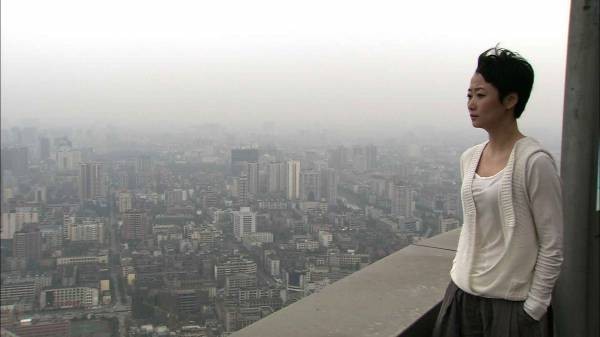 ZHAO TAOJia Zhang-ke looks at factory life in China
ZHAO TAOJia Zhang-ke looks at factory life in ChinaJia's latest feature doesn't reach out and grab you; rather it builds up a steady accumulation of detail in an artful and partly fictionalized documentary whose central concern is the transition from a planned economy to a market economy in China, with the Cultural Revolution along the way. Jia decided to use actors to play "real" "documentary" talking heads--people who worked at a certain factory now dismantled to become a five-star hotel--or their children, one of them, Su Na (Zhao Tao) working as a "shopper," making good money traveling to other countries and buying expensive goods for rich clients who want to spend but are too lazy to do so. This woman, who wept when she visited her mother in the factory for the first time and saw her numbing job, is the opposite extreme from the aging, now dim-witted "master" of the factory in its early days who worked seven days a week, and used the same tool till it wore down to nothing so as not to waste. The shift in China from the self-effacing collectivist mentality to the current entrepreneurial capitalism is so great that you can imagine why Jia takes refuge in still tableaux of people, composites, and a gallery of talking heads. But this is not as stimulating a film as earlier works like
Platform, Unknown Pleasures, The World, or
Still Life and will appeal only to the patient.
Actors are used for some of the people because Jia interviewed 130 people and had to create composites. Jia sees no problem in making use of fiction this way in telling fact: life as he sees it is a mixture of historical fact and imagination. He uses poems by classical poets including the Dream of the Red Chamber and William Butler Yeats as well as songs, including "The Internationale" sung by a group of oldsters, pop music, a Japanese classical composer, and contemporary music by a Taiwanese composer. Sometimes the camera is still as a person speaks. Sometimes one person or a group look silently into the camera for a minute or so.
The film, understandably, tells a tale of repression. It also witnesses people who were laid off in the 90's and suffered the lowering of an already frugal lifestyle.
There are strange stories. One woman describes being on a company trip when she and her husband lost their little boy. It was wartime and they felt obligated to go back on the boat to return to work, and they never saw their child again. An attractive woman known as "Little Flower" was the prettiest girl at the factory and when the photo of an unidentified handsome and athletic young man appeared on a bulletin board everyone told her he should become her husband. Silly as this was she began to dream of it--but then they were called together and told he was a pilot whose plane had crashed so he had died due to the malfunction of parts they had made at the factory. They were meant to feel guilty. A woman for years helped her sister in the country by sending clothes and other things to be recycled for her children. More recently she was laid off and became so strapped she had to rely on her "poor" country sister to help her out.
The focus is on the 420 Factory, which was founded in Chengdu, the capital of set up in Chengdu, capital of Sechuan in the late 50's to produce airplane engines. In early days its function was secret and workers, shipped there from all over the country, lived in virtual isolation; kids got into fights if they tangled with the locals, one man recounts. Later 420 was retooled to produce peacetime products such as washing machines.
Known actors such as Joan Chen or Jia regulars such as Zhao Tao and Chen Jianbin work together with unknown crew members to simulate the "interviews." Though Jia's logic in using this method to present composites makes sense, the effect is to undercut the feeling of realism. Probably the best thing about the film is the beautifully composed shots of the factory in operation and being dismantled, taken by cinematographers Yu Lik-wai and Wang Yu. While Jia's
Still Life was haunting and quietly powerful,
Useless seemed inexplicable and lazy. This is somewhere in between the two. Emotionally it has some import, but the mixed genre doesn't entirely work, and the sense of a Brave New World conveyed in Jia's diffuse but interesting
The World seems to have given way to adverts for capitalism. Is this so that Jia can work and travel freely and get his films shown at home? The leading Sixth Generation Chinese filmmaker may be slowly morphing into somebody else.
Screened as part of the 2008 New York Film Festival at Lincoln Center.
Links to my other Jia Zhang-ke reviews
here.





